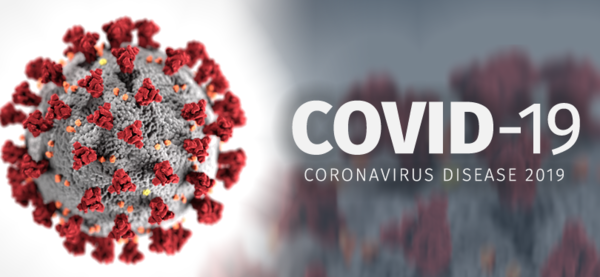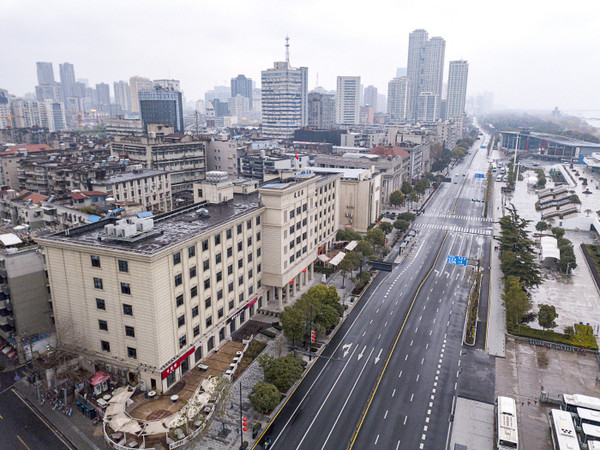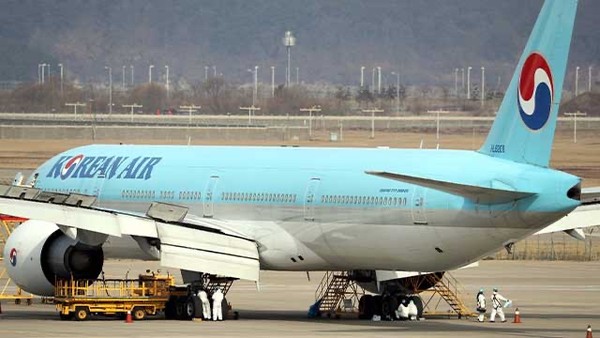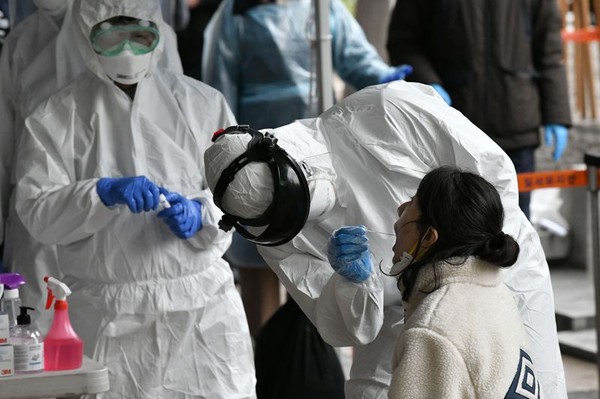
On January, a mysterious video quickly spread around the world on a social media platform. The video contained images of Chinese nationals in the city of Wuhan. All transportation services in Wuhan were halted by the government, and dust could be seen accumulating at empty gas stations. The city, once hustled and bustled with people visiting famous tourist attractions like the Forbidden City, had become a ghost town. Those walking along the streets would suddenly collapse and lose consciousness. Soon afterwards, people in white suits appeared to rush away the fallen person. Confirmed patients and deaths have been risen exponentially and people around the world are terrified. However, until now, there is no cure. SMT reporters took a look back on the spread of COVID-19 that began in China and analyze China’s action and position towards the virus from an international perspective. Let's start at the epicenter.

How it all started
COVID-19 (Corona Virus) is a contagious, and sometimes severe, respiratory disease caused by infection. COVID-19 was first detected on December 1, 2019, in Wuhan, China's Hubei province, but the cause and from where the initial outbreak started is still unclear. Since its discovery, a large number of people have been infected, and the virus quickly spread throughout the city of Wuhan, to other Chinese cities, and to other nations around the world. It brought out the number of infected people to about 81,113 as of 23 March compared to only 10,000 in January. At the moment, there have been about 3,207 deaths in China (as of 23 Mar), but there is a steady number of reported deaths in other countries including South Korea and Japan. While there were many criticisms of China for its slow initial response to the highly contagious virus, the Chinese government, itself, is also now acknowledging that they responded poorly. The Chinese Communist Party's Wuhan City Council, where the virus first emanated from, said, "If we had made a decision earlier and worked harder to control it, results would have been much different. I feel guilty, and I blame myself."1) China has slowed its effort since mid-January, even though it knew the number of infected people is still huge. It is suspected that about 5 million Wuhan citizens escaped from the city before the blockade. In response, the New York Times reported that on February 15, the Chinese national government had ordered a response at the beginning, but officials in the Wuhan province were slow to act. During the critical initial stage, many citizens from Wuhan and visitors to Wuhan travelled around China because of the Lunar New Year holidays (Chunjie), so the virus easily spread from population mobility.
Along with the rise of COVID-19 patients in China, confirmed cases have also begun to spring up around neighbouring nations including South Korea. On January 20, South Korea confirmed a Chinese person in the nation was found to be infected. Public anxiety and unrest in Korea grew with confirmed patients and the causes of the infection were revealed to the public. Secondary and tertiary infections were conjectured to be due to close human-to-human contact. The restaurant Hanilkwan in Apgujeong, where the third patient visited, closed its doors for about a week, and the CGV multiplex at Sungshin Women's University, where the fifth patient had gone, also closed its doors for a three-day quarantine. Many shops where patients were known to have visited have shut down their business over COVID-19 fear. The spread of the virus has also made many universities across South Korea change their academic semester schedules. Most universities including Sookmyung Women's University have either canceled or delayed the first year student entrance ceremony and the 2020 graduation ceremony. An article on this issue can be found in Formal Article of Sookmyung Times No. 357. Moreover, the Ministry of Education recommended universities to postpone their start from one to four weeks. Moreover, the first month of the semester was decided to be opened only through online videos. In other words, the damage caused by the virus is not only affecting small businesses but also schools and other businesses. The travel industry has also been hit hard by the aftermath of the COVID-19. Travel reservations in Southeast Asia including China have been continually cancelled one after another, and travel agencies are suffering financial losses. The number of transactions by Hana Tour fell 80.87 percent in February compared with two months earlier.2) Travel agencies are asking their staff to apply for sabbatical leaves of up to one year and to consider job-sharing, unpaid leave, a four-day work week, etc.

Locking the stable door after the horse is stolen
Due to the inability to control the COVID-19 in China, many countries have stepped up harsh responses. In particular, countries in Asia that border with China have been quick to act. On January 22, North Korea closed its border both air and rail. Neighboring Japan, on January 28, sent an ANA plane to Hubei province to bring home 206 Japanese people trapped in Wuhan. Soon after, it sent another flight to bring the remaining people. On February 1, the Japanese government announced a ban on entry to any Chinese citizen who had been issued Hubei province passports and any foreigners who visited there within a two week period. However, due to secondary and tertiary infections in the country, the number of people infected tops the lists as one of the most infected nations. Taiwan has also banned all foreigners and Chinese nationals from mainland China from entering the country, and Hong Kong and Macau implemented similar bans from February 6. Mongolia, which borders China, took a stronger response. It closed all borders with China on January 27 and ordered all levels of schools to close. As a result, Mongolia has not had a single confirmed patient as of February.
Other nations around the world, except Asian countries, reacted quickly as well. The U.S. deployed a chartered plane on January 28 for the return of American residents in Wuhan, and it then chartered another plane on February 3 to bring more citizens home. On January 31, the U.S. banned entry from all foreigners who have a history of visiting China within two weeks of the 31. On February 22, the U.S. government issued a level two alert regarding travel to Korea and Japan. Similar measures were taken in European countries. The U.K. and France flew their citizens home from Wuhan on January 31 and quarantined them as soon as they arrived. While the effort was made to curb the spread of COVID-19 in European countries, it sparked Asian hatred in Western countries. The head of school for the famous Italian music school Santa Cecilia sent an email to all instructors saying that Asian students from China, Korea, and Japan should not be permitted to sit in classes. 33 Koreans currently study at the school, and one student said, "I feel like I'm being viewed as a potential carrier of virus. This is xenophobia, and I’m not exaggerating!”.3) Widespread discrimination against Asians is spreading across Europe. Kim Jieun after returning from a trip to Greece in February said, "I felt like people were afraid of me. I was being avoided. This never happened at the last time I visited Europe. I felt like the fear of pickpockets had become less severe than the fear of an Asian person." Along with the soar in the number of patients in China and other Asian countries, discrimination has started to soar at a similar pace.

The dignity of life overshadowed by politics
COVID-19 is spreading globally, so it is only expected that it would make its way to South Korea, too. On January 19, a Chinese woman, the first confirmed patient in Korea, was isolated at Incheon Medical Center after showing signs of a fever upon entry to the nation via Incheon International Airport. The government’s initial response may have not been strong enough. Lee Jongkoo, professor of Medicine at Seoul National University, said, "COVID-19 does not pose much concern because of the advanced technology and communications ability in the nation. All critical patients will be given access to the best treatment."4) Even though the government was criticized for a slow initial response, with the rise of the number of infected people, the government has since strengthened its effort. The government announced that it would raise the alert level for infectious disease from attention to caution and vigilance and mobilize all personnel and resources to create a response team. In addition, President Moon said, "Pre-emptive measures will be implemented quickly and will be so strong that they could be considered as an excessive action.” This announcement paved the way for the health authorities to announce the creation of a 'COVID-19 Accident Investigation Headquarters'. Minister of Land said the department would deploy chartered planes for Korean in Wuhan. Despite these government efforts, as of March 16, 2020, there were more than 8,000 confirmed patients. In particular, more than 80% of infected reside in Daegu and North Gyeongsang province. There is a need for urgency to people solve problems such as the need for more supporting medical staff and medical masks. In addition, the safety of medical staff at the sited must be taken into consideration.
In the midst of fear of death, domestic politics continued to divide into sides. Among the various controversies and conflicts plaguing political debates today, two issues are closely followed by the public. The first is the term of ‘COVID-19’. The main opposition, the Liberty Korea Party, publicly denounced the incumbent government and attempted to change the name of the virus to the Wuhan pneumonia. In response, the Democratic Party of Korea said, "The name 'Wuhan pneumonia' is inappropriate, and we will follow the WHO's recommendation for the formal title of the disease." The WHO has a list of (2015) seven major nomenclature criteria that should not be used, such as geographic location, an individual’s name, a certain culture, or an industry when naming a new disease. WHO advises that disease names be general explanations of the disease based on disease symptoms, fearing problems of quarantine and discrimination. This last part can be tied directly to the ban of entry of Chinese tourists. The Liberty Korea Party said the nation should ban all Chinese tourists from entering the country and take a hard-line response. On the other hand, the current government is concerned about human rights and criticizes that ban as being an one-dimensional approach. It also said that the current administration will uphold international law and not view the matter only politically, but address the matter holistically. It is clear that at the center of all these conflicts is need to be extremely cautious about phrasing and wording as not to upset relations with China. However, above all, the nation and the world must care for people’s safety and dignity of life instead of fighting against the different 'colored' party politics. Lawmakers need to stop bickering and concentrate on finding an efficient solution in harmony.
Let's start from 'Me'
The current situation will not be resolved only within a single nation. Small effort by all, both globally and nationally, is essential. While wearing a mask will help prevent nasal infections. The more important thing is to wash one’s hands for at least 30 seconds. Moreover, if a person suspects they have the disease, they need to call 1339, not just covering up the illness. Smart, right-minded thinking and precautions will speed up containment and slow down the speed of spread. Let's overcome COVID-19 together from the basic everyday effort.
1) Jung Bongoh, "China's Wuhan Leaders Admit a "Lack of Early Response"", Dong-A Ilbo, February 1, 2020
2) Sung Jiwon, "Figured out "Extreme February", Joongang Ilbo, Mar 8, 2020
3) Kim Sukeun, ""Asian Students, Don't Come to Class"….'Indiscriminate' Hate Spreads", MBC, February 1, 2020
4) Ha Kyungdae, "COVID-19, the Situation Is Worse Than MERS 'No'...Opportunities to Increase Investment in Infectious Diseases 'YES'", MEDI:GATE NEWS, February 4, 2020
Jung Kim Hyeseung / Society Section Editor
smt_jhs@sookmyung.ac.kr
Oh Hwang Junhee / Society Section Editor
smt_hjh@sookmyung.ac.kr


